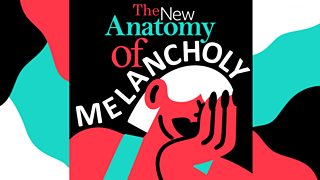Five things a 400-year-old self-help book has taught us
When it comes to self-help books, you might think that newer is better – after all, don’t we all want to tap into the latest tools and theories to become the best versions of ourselves? Readers of Robert Burton’s 1621 text, The Anatomy of Melancholy, might suggest otherwise. While it may not contain the latest buzzwords and mantras, this pioneering attempt to unpick and understand this universal human condition still feels remarkably prescient.

-
![]()
The New Anatomy of Melancholy
A new guide to what it is to suffer melancholy in the 21st century.
In The New Anatomy of Melancholy, Amy Liptrot uncovers how far our insight into melancholy has come in the last four centuries. With this insight, she’s creating an updated guide for the 21st century. How much of Burton’s seminal work holds up to today’s understanding of depression and mood disorders? Here, we’ll unpick five of Burton’s theories and coping mechanisms to find out.
1. Picking out patterns
For the sufferer, depression may feel as though it has no rhyme or reason, yet our moods can often follow quite similar patterns. Burton theorised that melancholy was “an hereditary disease” and he looked for patterns of mental illness in families and between generations. He may not have been wildly far off the mark: today, depression has been found to have both a genetic and an environmental component.
Depression has been found to have both a genetic and an environmental component.
Dr Frances Rice works with families to address depressive disorders. She says: “Where a parent has got severe depression I would like to see a service where the child and their broader family are involved in that care and get the opportunity to receive care themselves.”
It is not only genetic patterns which are useful in predicting mental illness; we can also study patterns in our behaviour.

Why is sad music often the most popular?
The reasons behind why we put ourselves through listening to sad music.
Robert Burton’s study of melancholy doesn’t just focus on low points, it also takes the reader to the dizzying heights of his emotions. With advances in our understanding of mood disorders, contemporary academics have suggested that Burton’s extreme ups and downs may in fact have been symptoms of bipolar disorder. He had a startling insight into his own ever-changing moods and the circumstances which affected them.
Today, this awareness can be seen as a vital tool in managing a mental illness. If we can notice patterns in our moods and behaviours, we can start to manage the external factors which contribute to them.
-
![]()
How having a purpose can help us
How having a purpose brings a clearer pathway.
2. The benefits of a cold dip
In his book, Burton drew together a huge range of ideas and texts written by others. The benefit of outdoor bathing “in fresh rivers and cold water” was one such theory he included, as it was said to be advisable for anyone who wished to live a long life. He may have been onto something here.
Dr Mike Tipton, Director of Research in the Extreme Environments Laboratory at the University of Portsmouth backs up this idea some 400 years later. He attributes it to something called cross adaptation: “As you get used to the stress of cold water, and you manage to deal with that better physiologically and at a cellular level, you’re also reducing the inflammatory response to other stresses that may underpin things like depression.”

Meet the ice swimmers
Jolyon Jenkins speaks to someone who wants to swim a mile through freezing cold water.
3. Being in the natural world
Nature, for Burton, was key for alleviating symptoms of melancholy. He extoled the virtues of herbs and flowers like borage and hellebores for clearing brain fog, purging the veins of melancholy, and cheering the heart. According to Professor Simon Hiscock, director of the , plants such as borage have been used for the treatment of melancholy, anxiety and depression since classical times. Not only was this unassuming herb thought to bring gladness, it is said to have been administered to Roman soldiers in wine to provide courage in battle.
Burton noted that the ‘gladdening’ effects of nature weren’t confined to edible plants. He was also a keen proponent of gardening, digging and ploughing to rouse up the body. For Monty Don, the gardener and broadcaster, this still rings true today. He describes the “powerful medicine” that comes from physically connecting with plants, handling soil and feeling the growth of foliage he’s planted.
-
![]()
Seven things we’ve learnt from Monty Don
Monty Don imparts some pearls of wisdom about gardening.
Monty Don has felt the benefits of exercise on his own encounters with depression: “I tend to find the best exercise is when it’s combined with some sort of function” he says. A dog walk, for instance, provides exercise, purpose and a connection with nature. Burton’s beliefs about the power of getting outside are now even being formally recognised and incorporated in NHS treatments.

Should gardening be prescribed on the NHS?
Garden for therapy? The hobby can help people with physical and mental health problems.
4. A problem shared
“The best way for ease is to impart our misery to some friend, not to smother it up in our own breast” said Burton, 400 years ago. Introspection and isolation are common behaviours amongst those experiencing depression. While this rarely makes the sufferer feel better, acting against these impulses by socialising can feel almost impossible.

Dr Frances Rice, who works with whole families to understand depression, suggests scheduling in enjoyable activities as part of a treatment plan. The act of scheduling provides some impetus to go through with the activities, increasing the patient’s chances of reaping their benefits, even if this is the opposite of what they feel they want to do.
When going to a GP about low moods, you might expect to be prescribed a course of antidepressants, but did you know doctors can now issue social prescriptions, such as art classes or walking groups?
If loneliness, rather than serious mental illness, is causing you to experience ‘anhedonia’, a loss of enjoyment in pleasurable activities, a social prescription could be far more useful than medication. Community is key. Burton, then, was onto something when he suggested to “use friends … whose jests and merriments may make thee glad.”
5. Work-life balance
Ok, so ‘work-life balance’ isn’t the exact terminology Burton would have used – he opted for the much more poetic ‘love of learning’ against ‘overmuch study’. His theory was that too much time spent hunched over reading and writing meant not enough time dedicated to other practises that we know are good for mental health like exercise, sleep and socialising. This is where the balance comes in: when our minds are restless and agitated, studying provides a welcome distraction, a positive focus and a sense of purpose. Too much study, however, and we become sedentary and solitary, neglecting the other activities that nurture a healthy mind.
Burton may have been writing 400 years ago, but his collection of theories on the causes, symptoms and treatments of melancholy remain useful and relevant to this day. Sure, his understanding of physiology is wildly outdated, but Burton, and those he studied, had an innate grasp of how best to alleviate our melancholic symptoms. If self-awareness, swimming, nature, community and reading worked for them; why not us?

How to get into running
How much money should you spend on running shoes? Vybarr Cregan Reid answers questions.
More from Radio 4
-
![]()
The New Anatomy of Melancholy
A new guide to what it is to suffer melancholy in the 21st century.
-
![]()
In Our Time: The Anatomy of Melancholy
Melvyn Bragg and his guests discuss a masterpiece of 17th-century medicine and literature: Robert Burton's The Anatomy of Melancholy.
-
![]()
The psychological impact of coronavirus
12 things we learned about coping with Covid-19 and life in lockdown.
-
![]()
16 personality traits and what they mean
Have you ever got muddled over the meaning of masochist, misogynist or misanthrope?






